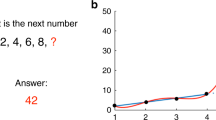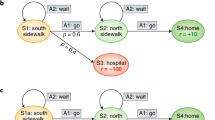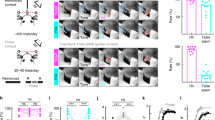Abstract
An earlier finding that learned behaviour can be transferred to naive subjects by injection of extracts of brains from trained animals is re-examined by a less ambiguous method. The possibility of transfer is confirmed, but the mechanisms involved are still obscure.
This is a preview of subscription content, access via your institution
Access options
Subscribe to this journal
Receive 51 print issues and online access
$199.00 per year
only $3.90 per issue
Buy this article
- Purchase on Springer Link
- Instant access to full article PDF
Prices may be subject to local taxes which are calculated during checkout
Similar content being viewed by others
References
Ungar, G., and Oceguera-Navarro, C., Nature, 207, 301 (1965).
Ungar, G., Fed. Proc., 25, 207 (1966).
Ungar, G., Proc. C.I.N.P. Conf., Washington, March 1966 (in the press).
Siegel, S., Non-parametric Statistics (McGraw-Hill, New York, 1956).
Byrne, W. L., et al., Science, 153, 658 (1966).
Babich, F. R., Jacobson, A. L., Bubash, S., and Jacobson, A., Science, 149, 656 (1965).
Ungar, G., and Cohen, M., Intern. J. Neuropharmacol., 5, 183 (1966).
Author information
Authors and Affiliations
Rights and permissions
About this article
Cite this article
UNGAR, G., IRWIN, L. Transfer of Acquired Information by Brain Extracts. Nature 214, 453–455 (1967). https://doi.org/10.1038/214453a0
Received:
Revised:
Published:
Issue Date:
DOI: https://doi.org/10.1038/214453a0
This article is cited by
-
Humoral link in the mechanism of formation of the food refusal conditioned response in the snail
Neuroscience and Behavioral Physiology (1988)
-
Chemical nature of a conditioned taste aversion factor
Bulletin of Experimental Biology and Medicine (1983)
-
Induction (transfer) of an operant behaviour by injection of brain extract
Psychopharmacologia (1973)
Comments
By submitting a comment you agree to abide by our Terms and Community Guidelines. If you find something abusive or that does not comply with our terms or guidelines please flag it as inappropriate.



